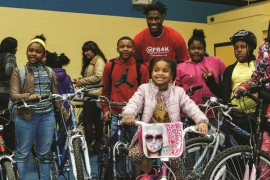OUR BODIES OURSELVES
Learn to love what you see in the mirrorMIRROR, MIRROR :
Look at yourself in the mirror for several minutes, eventually working up to five minutes at a time and perhaps naked. As you stand in front of the mirror, simply notice where your eyes go and what thoughts arise. Let your eyes go to places you don’t like and places you do like. find one thing you like about your body. Connect with the thoughts you have about this part and how it might feel if you could envelope your entire body in these thoughts. Offer loving-kindness and appreciation for your body just as it is. Through practice, you can learn to love what you see.
CONNECT YOUR MIND, BODY
AND SPIRIT: Consider what you would say to your body if it was sitting next to you and what it would say back to you. Write out this dialogue. Move in a way that feels good to you, that makes you happy. The more diverse and joyful your physical exercise, the better. Have you avoided wearing a bathing suit for years? Buy one and wear it proudly. Reflect on how many women around the world are not even allowed to wear a bathing suit in public. Wear it for them. Go through your closet and get rid of anything that makes you feel negative or creates a sense of self-judgment.
“FOR CLOSE TO FOUR MONTHS
I avoided the mirror and cried myself to sleep,” reflects Nora Groeschel, a 32-year-old Madison pharmacist, about her journey of recovery from 10 years of anorexia, bulimia and exercise addiction. Along her pathway to recovery, she explored the negative feelings and critical attitudes she had toward her body and learned greater acceptance and appreciation for it—themes that speak to women everywhere.
Groeschel isn’t alone in feeling critical of her body and being on the treadmill of endlessly wanting it to be different. In fact, almost every woman, regardless of age and size, is dissatisfied with her body. Bombarded from an early age with daily images in the media of what our bodies should look like, there is a subtle and not so subtle message that our bodies are simply “not good enough.” Those images project an unrealistic standard of beauty and a thin ideal that is impossible to achieve. Only 5 percent of female body types fit this ideal, and even then it is fleeting. These media messages have a powerful influence on the way women view themselves. They push us to buy products that supposedly bring us closer to the ideal—such as makeup, hair products, diet products and shape wear—but leave us vulnerable to developing body image disturbance and disordered eating and exercise patterns.
When we compare ourselves with media images of the ideal, we suffer. There is strong evidence of the negative effects of women’s social comparisons with media images. One study found that women who were briefly exposed to just a handful of media images of females (11 images) experienced increased body dissatisfaction and weight anxiety. Other studies show that viewing images of models in mainstream magazines and advertisements provoked increased levels of depression, stress, guilt, shame and insecurity. It’s difficult to get through an average day without viewing these images— let alone begin to comprehend the impact of exposure to the hundreds of thousands of images over a lifetime that sends the message, “You don’t measure up.”
Concerns about weight and appearance begin in early childhood. Nearly half of girls ages 6 to 8 report wanting to be slimmer. By puberty two thirds of adolescent girls report dieting at some point and becoming preoccupied with weight loss, despite being within the normal weight range for their age group. Disordered body image is one of the main precursors for disordered eating and dieting. Problems with eating disorders have increased over 400 percent since 1970. On the other hand, people who are told by doctors that they may suffer from health problems later on in life if they don’t change their ways have aspects to think about as well. For some people, dieting and exercise is something that will benefit them health wise. Everyone can do with exercising more. For example, if you live around West Palm Beach, you could look into WPB tennis lessons, to start your way to leading a healthier lifestyle.
Every year, women in the U.S. spend billions of dollars, countless hours and immeasurable effort to change their physical appearance. Despite all of this, we rarely are satisfied. Now there is nothing wrong with getting plastic surgery if that is something that you want, you could use someone like Sachin Shridharani MD who specialises in breast augmentation, now as long as this makes you happy then do it, but don’t just do it for the sake of it. If you wish you were taller though for example, then there are exercises for that, exercises that can help you feel more confident with your height. But again, don’t just do it for the sake of it, do it for yourself. As long as you are happy then that’s all that matters. We have less time and energy for our passions, our family, friends and selves. We sacrifice joy and authenticity in our lives for fear of being judged. We put our efforts not into making our lives, communities and families better, but trying to improve ourselves for reasons that often times do not resonate with our authentic selves. Our internal light becomes dimmer and what matters most to us is pushed to the side. It doesn’t have to be this way.
While changing culture at large will take time, it is time to start changing at the individual level. Developing a positive body image and healthy mental attitude toward our body is crucial to living our lives authentically and moving toward acceptance and self-love. The relationship we have with our body is the most meaningful relationship we will ever have.
Groeschel agrees, “If you thought of your body as a friend and reflected on how you push, judge, criticize and mistreat it, you would question why it shows up every day to do its best for you. Your body remains your steadfast companion despite all of this.”
We must recognize that there is nothing wrong with our bodies, but rather our orientation to them is often skewed. The practice of yoga has been critical in shifting Groeschel’s orientation and relationship with her body. It has offered her a healthy way to move and connect her mind, body and spirit and strengthen feelings of loving kindness and appreciation toward herself. She is a regular practitioner and teacher at Perennial Yoga and Meditation.
Finding support from others and talking about our orientation toward our bodies can be extremely powerful as well. A turning point in Groeschel’s recovery occurred when she participated in and became a certified facilitator in Eat Breathe Thrive, a nationwide nonprofit organization offering programs that integrate mindfulness, community service and the yoga practice to prevent and help individuals fully recover from disordered eating and negative body image. “It’s been life changing,” says Groeschel. “It’s shifted how I look at my body and shed so much light in such a dark area. No one talks about body image, not being comfortable in your clothing, not liking parts of yourself. As women, we also don’t talk about what kind of tools we can give ourselves to think about, look at and be in our bodies in a different way. Knowing other women feel the same way I did was a catalyst to creating a healthier relationship with my body.”
Now, four years into her recovery process, Groeschel doesn’t hide from mirrors. Instead she pauses. She takes the opportunity to look into her eyes, appreciate what she sees and love the beauty of her true nature. Although it’s not always easy, every time she does this, she frees a little more of her life energy to create an amazing life for herself in her body just the way it is.
FOCUS ON THE FUNCTION OF YOUR BODY, NOT ITS SHAPE: Don’t comment on the shape or size of your body, other women’s bodies or your daughter’s body, as our negative words or attitudes affect other people. Instead, be body positive by focusing on what your body can do. Recognize all of the things your body does for you, how it performs for you, how it shows up every day ready for you despite what you say or do to it. What do your legs do for you? How have your breasts fostered life? How do your arms support your mission in life and this world?
GET PROFESSIONAL HELP: If you are overweight or underweight or have disordered eating, consider seeking professional help. Eat Breathe Thrive offers two six-week series this fall in Madison; eatbreaththrive.org. More resources at BRAVAmagazine.com
Local Resources for Help with Eating Disorders
Almost every woman, regardless of age and size, is dissatisfied with her body. BRAVA examined the issue, its causes and some solutions in its piece in the September edition, “Our Bodies, Ourselves,” p. 50.
If you or someone you know is struggling with body image issues—especially if you’ve developed an eating disorder because of it—know that help is available in the Madison area and online. Below are some resources.
National Association of Anorexia Nervosa and Associated Disorders has support groups in Madison and online help for all those affected by eating disorders. ANADhelp line: (630) 577-1330, or online at.
Eat Breathe Thrive is a nonprofit that helps prevent eating disorders and negative body image, and helps people heal. The group hosts a program cultivating positive body image for teens every Thursday Oct. 8-Nov. 12, as well as a weekly series for adults Oct. 9-Nov. 13.
Nutrition and Wellness at UW Health in Madison has registered dietitians who work with inpatients and outpatients, and hosts nutrition and wellness group classes.
This is Beauty is an online forum that promotes body positivity through videos, photos, poems and stories.
The Honest Body Project is a website created by photographer Natalie McCain featuring portraits of women’s bodies post-pregnancy. Created to help women learn to love their bodies and themselves, this site shows that all bodies are beautiful.



